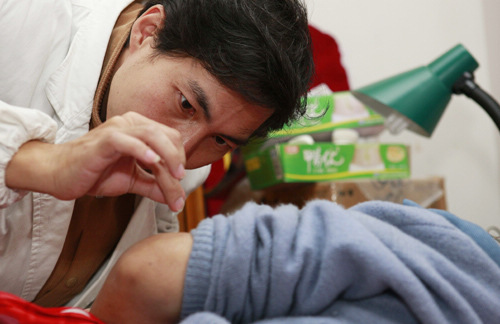|
 |
|
CLOSE BY: A GP at Shanghai Pengpu Community Healthcare Center treats a patient with acupuncture (PEI XIN) |
Du Xueping, Director of the Yuetan Community Healthcare Center in downtown Beijing's Xicheng District, has been involved in China's general practitioner (GP) trial program since it began.
As an important part of the country's medical reform, the introduction of a national GP system has been planned for almost 20 years. The Yuetan center is one of the first clinics in the country to trial the system.
"The trial program started in this center in 1994 and I came here in 1995," said Du, who used to be a cardiovascular specialist at Beijing's prestigious Fuxing Hospital.
"At the time, people didn't understand why I gave up a job in a big hospital to work in a small community center," Du said. "Even now, few people would choose to work in a community healthcare center. But based on my experience, community healthcare centers are actually more important for people's health than big hospitals."
Community-based GPs in China mainly provide primary care, treating acute and chronic illnesses in community-level medical institutions, according to Du. They also provide preventive care for local residents.
When she worked at Fuxing Hospital, Du received many patients each day. Many of the patients traveled hours or even days from other cities and towns for treatment.
"Cardiovascular diseases are generally urgent and severe," Du said. "Many patients coming to me were close to death. They had to spend a lot of money on surgery and suffered a great deal. But a lot of this suffering would have been avoided if they were given proper advice and treatment from their local healthcare centers."
Du would often give less seriously ill patients advice on how to stay healthy simply by improving their lifestyles with exercise and a balanced diet.
"But when giving that sort of advice, I found that in a large hospital I wasn't able to follow up. Without monitoring, patients often fail to maintain a healthy lifestyle," said Du, who believes that regular communication and contact with patients can greatly improve the effectiveness of treatment.
Du then made the decision to go to work in a community healthcare center in order to get closer to her patients. After the Yuetan center, which is affiliated to Fuxing Hospital, started the GP trial program, Du volunteered to work as a GP there.
"In those days, few people knew what a GP was and no medical universities in China had a major in general practice," said Du. Beginning in 2003, she began to give classes in general practice.
Li Xiaoxiao, with a master's degree in public medical healthcare, is one of Du's students. She has worked at the Yuetan center for more than three years.
Though Li has always been considered overqualified for her job, the 27-year-old is very happy with her choice.
"Even if somebody offers me a much higher profile job, I won't leave," said Li, who concluded a one-month training at Columbia University in the United States in September. "Honestly, I've never given a thought to leave. I believe my workmates would say the same."
"Compared to specialists who target specific parts of the body, GPs know more about the whole body. And since we live so close to residents, we have access to patients' families and treat the patients in a more comprehensive way," said Gao Ming, another GP at the Yuetan center. "For example, if a patient suffering from insomnia goes to a big general hospital, the doctors might ask them to take some pills. Even if doctors ask for the reasons behind the insomnia, they cannot really follow up in terms of diagnosis and treatment. But a GP can visit the patient regularly and help them deal with the problem in another way."
Lin Bo, a local resident, is a regular at the rehabilitation clinic in the Yuetan center.
"The service here is really good and it's convenient," said Lin, who comes to the center twice a week for neck problems. "When I am unable to visit the center, the physiotherapist comes to my apartment."
"We have a record of every chronic patient in the community and visit them at home regularly. When chronic patients or elderly inhabitants need to take regular exams, we will call them one by one and remind them to come to the center," Du said.
| 